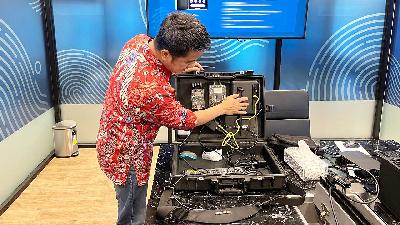The Dark Threat of Surveillance Equipment
Monday, May 6, 2024
The surreptitious purchase of surveillance devices is a threat to democracy and to people’s rights to privacy. It is also prone to embezzlement and abuse.
arsip tempo : 174715170891.

THE procurement of surveillance equipment in secret not only increases the risk of corruption, but also opens the door to abuses of power. Without a robust system of accountability, this technology could easily be used to spy on or put pressure on those critical voices that are essential to the health of a democracy.
This week’s collaborative reporting between Tempo and a number of media and human rights activists has discovered that the Indonesian government had bought large quantities of surveillance devices from overseas between 2017 and 2023. Hundreds of these devices worth tens of trillions of rupiah are believed to have been imported secretly by a number of organizations using state intermediaries. In Indonesia, these buyers include the National Police, the State Intelligence Agency, and the National Cyber and Encryption Agency.
Indeed, this wiretapping equipment could help law enforcers uncover crimes such as corruption and terrorism. But, like a double-edged sword, without stringent controls, this surveillance equipment could easily be misused to monitor the movements of groups critical of the government. Indications of such bad intentions can be seen from the surreptitious purchase from nations that do not have diplomatic relations with Indonesia, such as Israel. Unfortunately, this crooked practice has already come to pass.
Back in June 2023, Tempo, together with IndonesiaLeaks consortium, also revealed the use of Pegasus in Indonesia. This spyware, costing hundreds of billions of rupiah, is produced by Israeli firm NSO Group Technologies, and is believed to have been used to access conversations, telephone numbers, photographs and videos belonging to politicians in the run up to the 2019 elections.
Suspiciously, the large-scale purchase of surveillance equipment is also followed by serious violations of the right to privacy and digital attacks on individuals critical of the government. According to Amnesty International, from 2019 to May 2022, there were at least 90 violations and digital attacks on 148 human rights activists, environmental activists, journalists and students.
The secretive procurement of this surveillance equipment also shows the blessing of the Indonesian state for the authoritarian enclave practice used in a number of institutions. In authoritarian states, the government is always suspicious about those who are critical or who are seen as enemies.
This excessive desire by the state to spy on its own citizens is increasingly difficult to stop because there are no adequate surveillance regulations. The Wiretapping Bill has ground to a halt at the House of Representatives. The lack of a clear legal framework, including an oversight mechanism and sanctions, makes it possible for state institutions to misuse these tools in the interests of the government.
As well as endangering democracy, this surreptitious purchase of surveillance equipment is also a strong indicator of corruption, especially since there has never been a transparent audit of the purchase of this equipment. Therefore, as long as the rules for surveillance equipment and its use are not yet clear, there should be a moratorium on its purchase. Without accountability, this surveillance equipment will only become a means of supporting a government that has become increasingly authoritarian.











